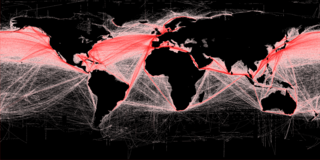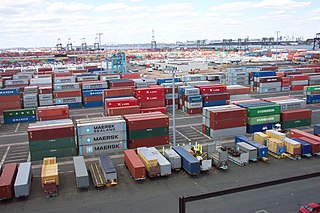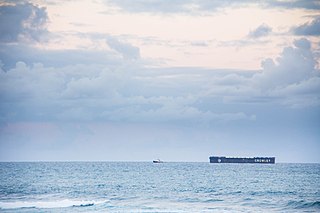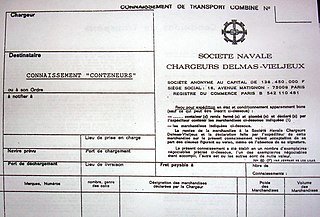Related Research Articles

Freight transport is the physical process of transporting commodities and merchandise goods and cargo. The term shipping originally referred to transport by sea but in American English, it has been extended to refer to transport by land or air as well. "Logistics", a term borrowed from the military environment, is also used in the same sense.

Containerization is a system of intermodal freight transport using intermodal containers. Containerization is also referred as "Container Stuffing" or "Container Loading", which is the process of unitization of cargoes in exports. Containerization is the predominant form of unitization of export cargoes unlike other systems viz the barge system or the palletization. The containers have standardized dimensions. They can be loaded and unloaded, stacked, transported efficiently over long distances, and transferred from one mode of transport to another—container ships, rail transport flatcars, and semi-trailer trucks—without being opened. The handling system is completely mechanized so that all handling is done with cranes and special forklift trucks. All containers are numbered and tracked using computerized systems.

The Automated Transfer Vehicle, originally Ariane Transfer Vehicle or ATV, was an expendable cargo spacecraft developed by the European Space Agency (ESA), used for space cargo transport in 2008–2015. The ATV design was launched to orbit five times, exclusively by the Ariane 5 heavy-lift launch vehicle. It effectively was a larger European counterpart to the Russian Progress cargo spacecraft for carrying upmass to a single destination—the International Space Station (ISS)—but with three times the capacity.
The Incoterms or International Commercial Terms are a series of pre-defined commercial terms published by the International Chamber of Commerce (ICC) relating to international commercial law. They are widely used in international commercial transactions or procurement processes and their use is encouraged by trade councils, courts and international lawyers. A series of three-letter trade terms related to common contractual sales practices, the Incoterms rules are intended primarily to clearly communicate the tasks, costs, and risks associated with the global or international transportation and delivery of goods. Incoterms inform sales contracts defining respective obligations, costs, and risks involved in the delivery of goods from the seller to the buyer, but they do not themselves conclude a contract, determine the price payable, currency or credit terms, govern contract law or define where title to goods transfers.
Cargo consists of bulk goods conveyed by water, air, or land. In economics, freight is cargo that is transported at a freight rate for commercial gain. Cargo was originally a shipload but now covers all types of freight, including transport by rail, van, truck, or intermodal container. The term cargo is also used in case of goods in the cold-chain, because the perishable inventory is always in transit towards a final end-use, even when it is held in cold storage or other similar climate-controlled facility. The term freight is commonly used to describe the movements of flows of goods being transported by any mode of transportation.

FOB is a term in international commercial law specifying at what point respective obligations, costs, and risk involved in the delivery of goods shift from the seller to the buyer under the Incoterms standard published by the International Chamber of Commerce. FOB is only used in non-containerized sea freight or inland waterway transport. As with all Incoterms, FOB does not define the point at which ownership of the goods is transferred.
Protection and indemnity insurance, more commonly known as P&I insurance, is a form of mutual maritime insurance provided by a P&I club. Whereas a marine insurance company provides "hull and machinery" cover for shipowners, and cargo cover for cargo owners, a P&I club provides cover for open-ended risks that traditional insurers are reluctant to insure. Typical P&I cover includes: a carrier's third-party risks for damage caused to cargo during carriage; war risks; and risks of environmental damage such as oil spills and pollution. In the UK, both traditional underwriters and P&I clubs are subject to the Marine Insurance Act 1906.
Marine insurance covers the loss or damage of ships, cargo, terminals, and any transport by which the property is transferred, acquired, or held between the points of origin and the final destination. Cargo insurance is the sub-branch of marine insurance, though Marine insurance also includes Onshore and Offshore exposed property,, Hull, Marine Casualty, and Marine Liability. When goods are transported by mail or courier, shipping insurance is used instead.

Crowley Maritime Corporation, is based in Jacksonville, Florida. Founded in 1892, Crowley is primarily a family- and employee-owned vessel management, owner, and supply chain logistics services company, providing services globally. As of July 2016, Crowley was ranked as the 13th largest private company in Florida, employing approximately 5,300 people worldwide with revenues of $2.2 billion. It provides its services using a fleet of more than 300 vessels, consisting of RO-RO vessels, LO-LO vessels, tankers, Articulated Tug-Barges (ATBs), tugs and barges. Crowley's land-based facilities and equipment include terminals, warehouses, tank farms, and specialized vehicles.

A freight forwarder, forwarder, or forwarding agent, is a person or company that organizes shipments for individuals or corporations to get goods from the manufacturer or producer to a market, customer or final point of distribution. Forwarders contract with a carrier or often multiple carriers to move the goods from one country to another.

The Sikorsky CH-53K King Stallion is a heavy-lift cargo helicopter produced by Sikorsky Aircraft for the United States Marine Corps. The King Stallion is an evolution of the long running CH-53 series of helicopters which have been in continuous service since 1966, and features three upgraded 7,500 shp (5,590 kW) engines, new composite rotor blades, and a wider aircraft cabin than its predecessors. It is the largest and heaviest helicopter in the U.S. military. The Marine Corps plans to receive 200 helicopters at a total cost of $25 billion. Ground Test Vehicle (GTV) testing started in April 2014; flight testing began with the maiden flight on 27 October 2015. In May 2018, the first CH-53K was delivered to the Marine Corps.

In insurance claims, a total loss or write-off is a situation where the lost value, repair cost or salvage cost of a damaged property exceeds its insured value, and simply replacing the old property with a new equivalent is more cost-effective.
Gard is a global operator within marine insurance and is the largest Protection & Indemnity insurer among the thirteen members of the International Group of P&I Clubs. The company ranks second in the marine insurance industry behind Allianz. Its clients include shipowners and operators, shipyards, and companies involved in the upstream oil and gas markets, as well as windfarm operators. The group employs more than 550+ people in 13 offices in Arendal, Athens, Bergen, Bermuda, Helsinki, Hong Kong, Imabari, London, New York, Oslo, Singapore, Rio de Janeiro, and Tokyo.

A heavy-lift ship is a vessel designed to move very large loads that cannot be handled by normal ships. They are of two types:

The history of insurance traces the development of the modern business of insurance against risks, especially regarding cargo, property, death, automobile accidents, and medical treatment.
Soft Cost is a construction industry term but more specifically a contractor accounting term for an expense item that is not considered direct construction cost. Soft costs include architectural, engineering, financing, and legal fees, and other pre- and post-construction expenses. The term has been replaced in most contractor accrual accounting with the term General & Administrative abbreviated G&A.

Piracy in the 21st century has taken place in a number of waters around the world, including the Gulf of Guinea, Strait of Malacca, Sulu and Celebes Seas, Indian Ocean, and Falcon Lake.
A shipping agency or shipping agent is the designated person or agency held responsible for handling shipments and cargo, and the general interests of its customers, at ports and harbors worldwide, on behalf of ship owners, managers, and charterers. In some parts of the world, these agents are referred to as port agents or cargo brokers. There are several categories of shipping agents such as: port agents, liner agents, and own agencies, each rendering specific services depending on the shipping company they represent.

A bill of lading is a document issued by a carrier to acknowledge receipt of cargo for shipment. Although the term historically related only to carriage by sea, a bill of lading may today be used for any type of carriage of goods. Bills of lading are one of three crucial documents used in international trade to ensure that exporters receive payment and importers receive the merchandise. The other two documents are a policy of insurance and an invoice. Whereas a bill of lading is negotiable, both a policy and an invoice are assignable. In international trade outside the United States, bills of lading are distinct from waybills in that the latter are not transferable and do not confer title. Nevertheless, the UK Carriage of Goods by Sea Act 1992 grants "all rights of suit under the contract of carriage" to the lawful holder of a bill of lading, or to the consignee under a sea waybill or a ship's delivery order.

In March 2021, the Suez Canal was blocked for six days after the grounding of Ever Given, a 20,000 TEU container ship. The 400-metre-long (1,300 ft) vessel was buffeted by strong winds on the morning of 23 March, and ended up wedged across the waterway with its bow and stern stuck in the canal banks, blocking all traffic until it could be freed. Egyptian authorities said that "technical or human errors" may have also been involved. The obstruction occurred south of the section of the canal that had two channels, so there was no way for other ships to bypass Ever Given. The Suez Canal Authority (SCA) engaged Boskalis through its subsidiary Smit International to manage marine salvage operations. As one of the world's busiest trade routes, the canal obstruction had a significant negative impact on trade between Europe, Asia and the Middle East.
References
- ↑ "About Project Shipping". Project Cargo Network. Retrieved 6 December 2012.
- ↑ "Marine Delay in Start Up Insurance". Allianz.com. Retrieved 6 December 2012.